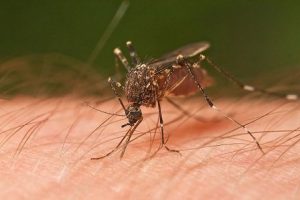When mosquitos attack – natural alternative to chemical bug sprays

For generations we’ve reached for the insect repellent when mossies attack. Advertising tells us that’s how to ensure a good weekend will be had. Most of us have childhood memories of basting ourselves in the nasty-smelling stuff from head to toe on warm summer evenings. We had no idea what was in it, we just knew that it worked. And that was enough.
Until now.
In these more enlightened times we’re learning that the chemicals in some repellents should be handled with a lot more caution than they were in the past. N,N-Diethyl-meta-toluamide, DEET for short, is the most common chemical used in commercial insect repellent and while it’s generally considered safe for human use in low doses, there have been reports of adverse effects in some groups.
What is DEET?
Scientists working for the United States Army first developed DEET in the 1940s as a means to prevent soldiers in jungle areas from contracting malaria, yellow fever and other potentially fatal insect-borne diseases. A compound in DEET, also found in eucalyptus, is believed to be particularly repugnant to insects. DEET is officially classified as a pesticide by the U.S. Environmental Protection Agency (EPA).
Is DEET safe?
While approving it for use in commercial insect repellents, the EPA requires all products that contain DEET to carry warnings and restrictions on the product label. In a fact sheet on DEET, the EPA also raises concern over a report which linked the use of DEET to seizures in children. DEET is classified by the EPA as a Group D carcinogen (not carcinogenic to humans.)
In 2002 Canada banned the sale of products containing more than 30{648ff2b140dd79f8b10f01740237e66061b7c0f8b396ba52d99047c684c8722c} DEET due to what they described as ‘health concerns’ and advised that for children between the ages of 2 and 12 only products containing 10{648ff2b140dd79f8b10f01740237e66061b7c0f8b396ba52d99047c684c8722c} of DEET or less should be applied to the skin. They also advise that DEET should not be used on any child under the age of 6 months.
What are the natural alternatives?
Research has shown¹ that oils such as thyme oil, clove oil and lemongrass oil repel insects for up to two-and-a-half hours when applied to the skin. Their effectiveness was shown to be just as potent as DEET, however the duration of that effectiveness was deemed to be less.
Australia’s own eucalyptus oil has been proven to be very effective as an insect repellent.² It contains a similar repelling agent as that found in DEET. It’s so effective that a natural chemical called PMD (produced by distilling the leaves of the lemon-scented gum), is one of only two non-DEET repellents endorsed by the U.S. Center for Disease Control and Prevention.
National Custom Compounding has access to very pure oils for making effective, all natural insect repellents. Our exclusive Mozzie and Midgie Oil tincture contains clove oil, eucalyptus oil, thyme oil, lemongrass, citrus oil, orange oil, almond oil and nothing else. For more information on our natural bug repellent visit the Mozzie and Midgie page on our website.
References
- Barnard DR: Repellency of essential oils to mosquitoes (Diptera: Culicidae). J Med Entomol. 1999, 36: 625-629.
- Carroll SP, Loye J: PMD, a registered botanical mosquito repellent with deet-like efficacy. J Am Mosq Control Assoc. 2006, 22: 507-514. 10.2987/8756-971X(2006)22[507:PARBMR]2.0.CO;2.
